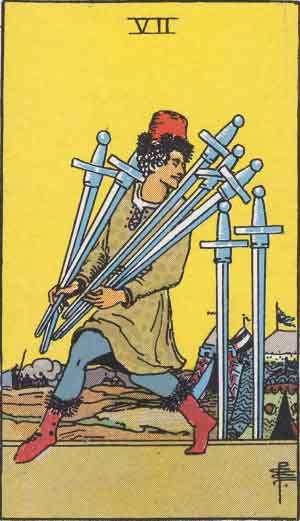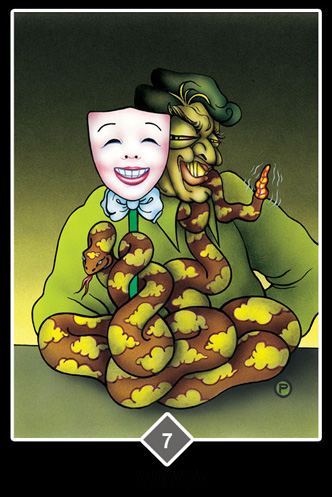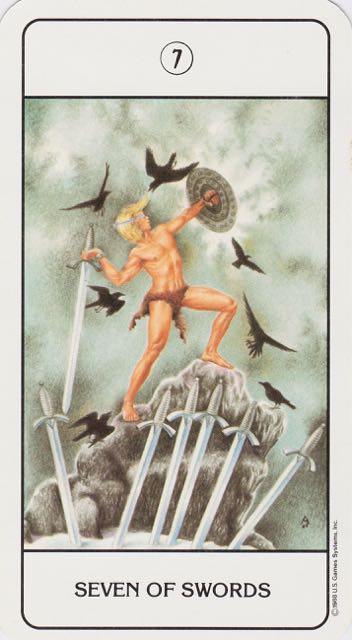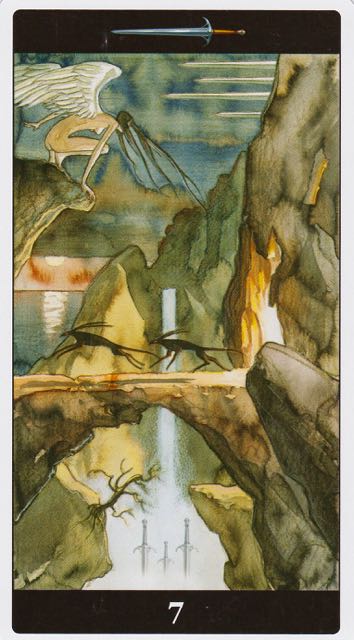
Seven of Swords
A man in the act of carrying away five swords rapidly; the two others of the card remain stuck in the ground. A camp is close at hand. Divinatory Meanings: Design, attempt, wish, hope, confidence; also quarrelling, a plan that may fail, annoyance. The design is uncertain in its import, because the significations are widely at variance with each other. Reversed: Good advice, counsel, instruction, slander, babbling.
A. E. Waite, Pictorial Key to the Tarot (1911)
A man in the act of carrying away five swords rapidly; the two others of the card remain stuck in the ground. A camp is close at hand. Divinatory Meanings: Design, attempt, wish, hope, confidence; also quarrelling, a plan that may fail, annoyance. The design is uncertain in its import, because the significations are widely at variance with each other. Reversed: Good advice, counsel, instruction, slander, babbling.
A. E. Waite, Pictorial Key to the Tarot (1911)
Represents the application of mental energy in a cautious, wily and diplomatic way in order to gain the end desire. But one cannot be sure of the rightness or moral integrity of the goal and the mind can be cold and manipulative. Live may require us to develop such attributes like politicians and priests have, even if our nature dislike such obvious cunning. When we loose our ambition through weakness of will we fight difficulties, compromise and betrayal, unintentional or otherwise, we are restless and destructive. All this is about to take a risk in order to get out of a boring situation, regardless of the consequences.

7 of Clouds: Politics
Do you recognize this man? All but the most innocent and sincere of us have a politician lurking somewhere in our minds. In fact, the mind is political. Its very nature is to plan and scheme and try to manipulate situations and people so that it can get what it wants. Here, the mind is represented by the snake, covered with clouds and "speaking with a forked tongue". But the important thing to realize about this card is that both faces are false. The sweet, innocent, "trust me" face is a mask, and the evil, toxic, "I'll have my way with you" face is a mask, too. Politicians don't have real faces. The whole game is a lie.
Take a good look at yourself to see if you have been playing this game. What you see might be painful, but not as painful as continuing to play. It doesn't serve anybody's interest in the end, least of all yours. Whatever you might achieve in this way will just turn to dust in your hands.

Tarot of the Ages - Mario Garizio ©1988 U.S. Games Systems, Inc.
Stealing from anyone is a risky exercise, but stealing from someone who has both the ability and the motivation to punish you - such as the inhabitants of the military camp on the Seven of Swords - is often downright foolish. Such cunning and confidence are two of the hallmarks of the Seven of Swords, as it stands for those times when guile and diplomacy will bring about the results that brute force will not. But the Seven of Swords has that same double edge as the rest of the cards in its suit, and thus it implies that you can be the victim of such deception.
Whether or not the outcome is successful, the Seven of Swords usually refers to plans in which deception or guile is a key factor. This is the card of the con artist, the thief and the trickster. All of these types of people usually work alone, fearing that the incompetence of others will interfere with their work. Hence they develop a kind of "Lone Wolf" mentality which could eventually prove detrimental. On the Rider-Waite card, the man cannot carry all of the swords and must leave two of them behind. By implication, this is an incomplete victory, though success appears to have been achieved.
At other times the victory is not so complete. The Seven of Swords often shows or predicts a loss due to cunning and trickery. The cunning may be that of another person who cheats you out of a hard-earned victory, or who swindles your money away from you. Or it could be your own trickery that leads to your undoing. Both of these scenarios offer lessons. The unethical victory of another person should be used as a model of what to watch for in similar situations in the future. On the other hand, having your deception exposed should teach you that deception is not the best way to win!
The last meaning of the Seven of Swords, one that is not too apparently connected with the others, is indecision. When you have to do what you felt was wrong in order to succeed, or when you do something that you thought was right but that put you in danger, your whole ethical system can be challenged and warped. If you have to compromise your values in order to achieve the goals you have set, you should either revise your ethics or re-evaluate your goals - probably the latter. Society as a whole does not look well upon the Machiavellian belief of ends justifying means. The vigilante approach of the Seven of Swords is rarely the best one.

Tarot of the Dream Enchantress ©2009 Lo Scarabeo